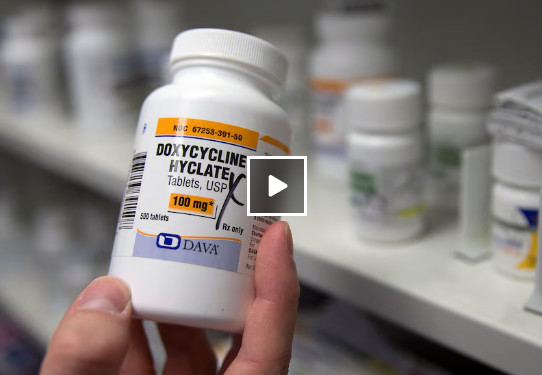
US Health Officials Advise Using Antibiotic as a ‘Morning-After Pill’ Against STDs
U.S. health officials have issued a new recommendation for preventing certain sexually transmitted diseases (STDs). They now suggest that some individuals consider taking an antibiotic as a “morning-after pill” to help prevent infections.
CDC’s New Guidelines
🏥 CDC Recommendation
The Centers for Disease Control and Prevention (CDC) finalized its endorsement of using doxycycline after unprotected sex to prevent infections such as chlamydia, gonorrhea, and syphilis. This recommendation marks a significant development in the prevention of sexually transmitted infections (STIs), a field that has seen few new tools in recent decades.
📈 Rising Infection Rates
The need for innovation is pressing, as rates of syphilis, chlamydia, and gonorrhea have been increasing for years, particularly among gay and bisexual men. However, the latest data suggests that cases of chlamydia and gonorrhea stopped rising in 2022.
Who Should Consider Doxy PEP?
👬 Specific Populations
The new guideline is specifically directed at gay and bisexual men and transgender women who have had an STD in the previous year and are at high risk of getting infected again. Studies have shown that doxycycline is effective in this group, but there is not enough evidence to extend the same recommendation to other populations.
💊 Doxy PEP Explained
The treatment is referred to as doxy PEP, short for doxycycline postexposure prophylaxis. The CDC advises doctors to prescribe a single dose of 200 milligrams of doxycycline to be taken within three days of unprotected sex.
Changes to the Guidelines
📜 Draft to Final Guidelines
The CDC released a draft version of the guidelines in October. Following a public comment period, the proposed language was adjusted. One key change clarified that the pills should be taken only once per 24 hours, and doctors should reassess the regimen with patients every three to six months.
💬 Public Input
Public comments helped refine the guidelines, ensuring they are clear and practical for both healthcare providers and patients.
The Importance of Doxy PEP
🛠️ A New Prevention Tool
Doxy PEP represents the first new prevention tool against sexually transmitted infections in decades. This is particularly important as traditional methods, such as condoms and regular testing, while effective, have not been sufficient to curb rising infection rates.
🌍 Public Health Impact
By introducing doxy PEP, the CDC aims to provide an additional layer of protection, especially for high-risk groups, potentially reducing the overall incidence of STIs.
How Doxy PEP Works
🧠 Mechanism of Action
Doxycycline is an antibiotic that can prevent bacterial infections by interfering with the bacteria’s ability to produce proteins. When taken shortly after exposure, it can prevent the bacteria from establishing an infection.
⏲️ Timing and Dosage
For doxy PEP to be effective, it must be taken within three days of unprotected sex. The recommended dose is 200 milligrams, taken as a single dose. This timing is crucial to ensure the antibiotic can act before the bacteria have a chance to multiply.

Assessing the Effectiveness
📊 Study Results
Studies have demonstrated that doxycycline is effective in preventing STIs in the specified high-risk groups. These studies form the basis of the CDC’s recommendation, providing strong evidence that doxy PEP can significantly reduce the incidence of chlamydia, gonorrhea, and syphilis.
🔬 Ongoing Research
While current research supports the use of doxy PEP in certain populations, ongoing studies aim to gather more data and potentially expand the recommendation to include other groups in the future.
Practical Considerations
💡 Implementation
For healthcare providers, implementing doxy PEP involves discussing the option with eligible patients, prescribing the appropriate dosage, and scheduling regular follow-ups to reassess the treatment plan.
💬 Patient Education
Educating patients about the correct use of doxy PEP, including the importance of timely administration and the need for follow-up appointments, is crucial for the treatment’s success.
Addressing Concerns
⚠️ Antibiotic Resistance
One concern with widespread antibiotic use is the potential for antibiotic resistance. The CDC guidelines emphasize that doxy PEP should be used judiciously and only in the specified high-risk groups to mitigate this risk.
🛡️ Safe Practices
In addition to doxy PEP, the CDC continues to recommend traditional safe sex practices, such as using condoms and regular STI testing, as part of a comprehensive approach to preventing STIs.
Conclusion
📝 Summary
The CDC’s new recommendation for using doxycycline as a morning-after pill to prevent certain STIs represents a significant step forward in public health. This new tool offers hope for reducing infection rates, particularly among high-risk groups.
🚀 Moving Forward
As research continues and more data becomes available, the CDC’s guidelines may evolve, potentially expanding the use of doxy PEP to other populations. For now, healthcare providers and patients can work together to implement this innovative strategy effectively.
By staying informed and proactive, we can take meaningful steps toward reducing the burden of sexually transmitted infections and improving public health outcomes for all.



















